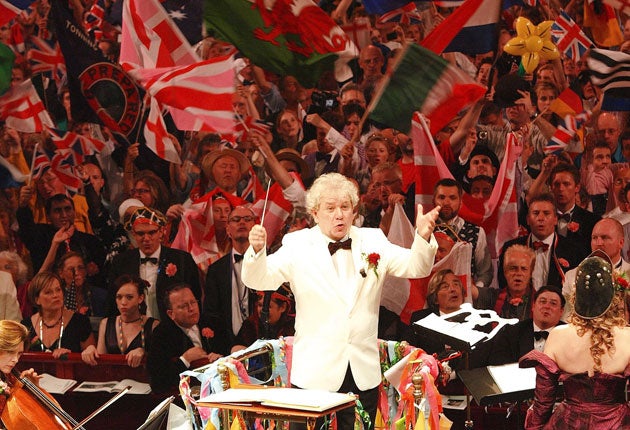David Lister: The Proms have broken many barriers, but a few still remain
The Week in Arts

The biggest music festival in the world started last night.
The Proms are not just a wonderful opportunity to hear classical music by some of the best orchestras and soloists in the world. They are, with the astonishingly cheap £5 promenade tickets and an infectious atmosphere, a real opportunity to bring in that always elusive new, young audience.
Under the strong stewardship of Roger Wright, the Proms in recent years have made some headway in doing just this. The Doctor Who proms and other children's events have given the very young an introduction to classical music. The effort by Wright to discourage some of the stuffier conventions of the classical music audience has also helped to dispel the feeling of exclusivity that can surround the music. He has, for example, sided with those who commit the supposedly cardinal sin of clapping between movements at symphonies. Some of the regulars deplore that, but it hasn't yet brought about the end of civilisation.
More, though, can be done to make the Proms and classical music more inclusive. For a start, there's the encore. Nearly every concert has an encore when a soloist or sometimes an orchestra will come back to play something. Almost never are we told what they are playing, and I have often had to ask around as I leave the Royal Albert Hall. Of course, at rock concerts we are also never told, but that's rather different as rock gigs are attended by fans of the artist playing, and they are likely to be familiar with all his or her work. Few people know every piece written for the violin. Would it be so terrible for the audience to be told what is being played?
That, however, would mean someone from the stage speaking to the audience. And that, too, is something too rarely done at the Proms. A few words from the conductor to introduce a concert – in the way that Daniel Barenboim sometimes does so brilliantly – is invaluable for an audience, particularly an audience new to a work.
Lastly, the Proms – like nearly every arts event I go to – does not give enough thought to how important the programmes are that concert-goers buy. I have been looking at the Proms season programme and it is better than many I see. But it is still inadequate for the non-expert, for the new audience. A regular feature in the Proms programme is called "Spotlight On...", where the spotlight is shone on a particular virtuoso performing. But does it say what nationality they are? Does it say how old they are? No. Some spotlight.
The Proms will be the cultural highlight of the summer. Mr Wright's mission, if he chooses to accept it, is to make it the cultural highlight for those new to classical music, as much as for the connoisseurs.
Max's forgotten role in pop music history
The über-PR Max Clifford has spoken, not for the first time, about his connection to The Beatles. The 19-year-old Clifford was apparently a member of the group's press team at EMI in the early Sixties. Indeed, his Wikipedia entry says he "was given the job of promoting an unknown and unwanted group called The Beatles early in their career, including their first tour of the United States". In an interview this week, Clifford discussed a picture of the band with George Martin and the back of someone's head. The head, he revealed, belonged to none other than himself.
I have remarked before how odd it is that in the legion of books published about The Beatles, Clifford's role is literally never mentioned. In the thousands and thousands of interviews given by the group's members over the years, they have churlishly never referred to the invaluable promotion they received from the young publicist.
I have just finished reading a new book called Fab by Howard Sounes, the most comprehensive biography to date of Sir Paul McCartney, and, yet again not a single mention of Clifford or how he helped to put McCartney on the road to riches. When will the pivotal role of the true fifth Beatle be properly acknowledged, and the story of John, Paul, George, Ringo and Max be told at last?
Can't wait for Rebekah – the movie
Last week, I speculated on who might play Rebekah Brooks in a movie about the hacking scandal. I suggested the Hollywood actress Julianne Moore. I was a bit surprised to receive an email a couple of days later from a Hollywood screenwriter, saying he had just been discussing a film treatment and thought Julianne Moore a good idea. Remember me in your will, Julianne, if you get the part.
Meanwhile, someone has registered "notwmovie" as an internet domain. The scandal can certainly make a movie, but I'm not sure that News of the World is a particularly imaginative or alluring title for it. I'd go for Rebekah plain and simple. Some might think it could be confused with Hitchcock's Rebecca starring Laurence Olivier and Joan Fontaine. But that film was about a very rich man taking a much younger woman under his wing. So no confusion there.
d.lister@independent.co.uk
Join our commenting forum
Join thought-provoking conversations, follow other Independent readers and see their replies
Comments
Bookmark popover
Removed from bookmarks